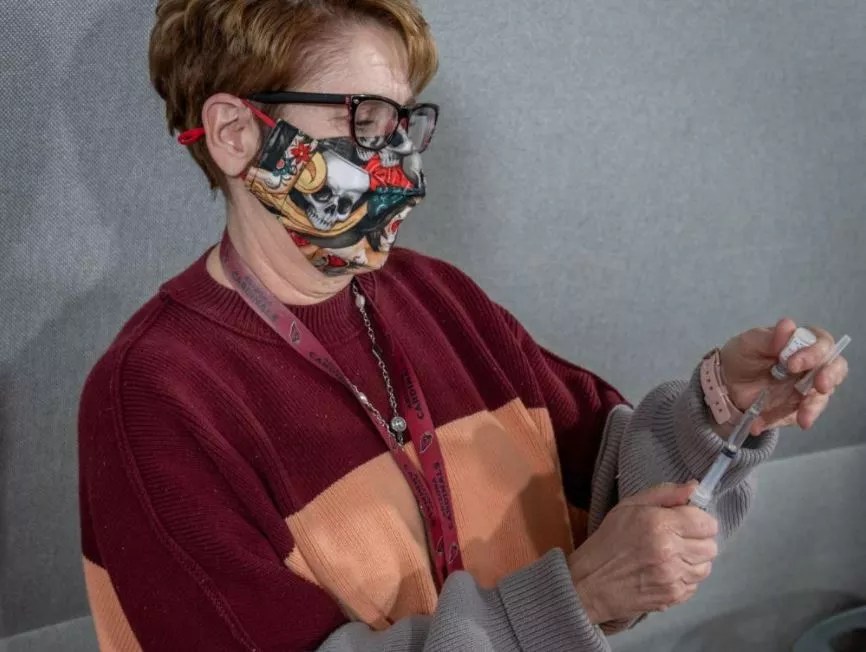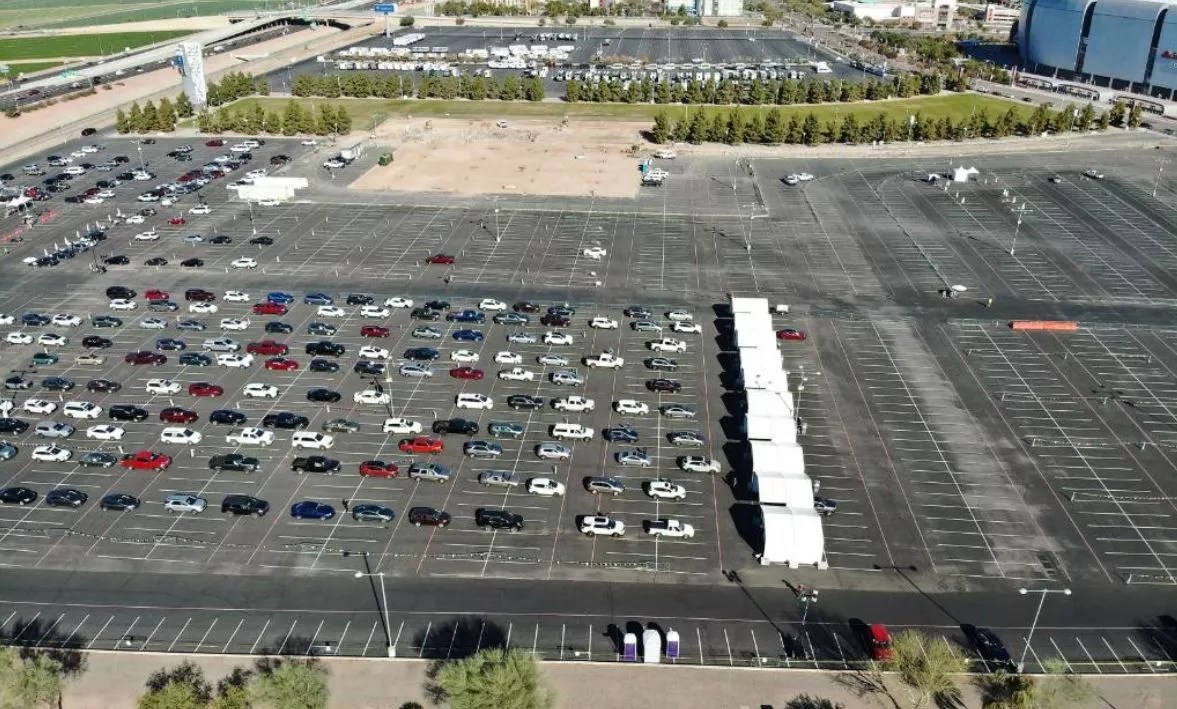
AZDHS Twitter

Audio By Carbonatix
Before he was eligible for a COVID-19 vaccine, Mike Bucca got a text from a friend at a law firm, who told him that Blue Cross Blue Shield offered a shot for people who worked an eight-hour volunteer shift.
“You’ll get the shot, and the second shot later,” he was told.
Bucca, a State Farm insurance agent, jumped at the chance. He’s 65, but before the state opened up vaccinations for people his age, he registered for the job. No day shifts were open, so he took the 10 p.m. to 6 a.m. slot. Assigned randomly to the State Farm Stadium state vaccination site in Glendale, Bucca, who had never handled a hypodermic syringe before, found himself assisting a medic in more than 300 drive-up vaccinations as the temperature dropped to 37 degrees. People were usually very happy to get the vaccine, he said.
“It was quite a night,” he said. “It was just about the most rewarding volunteer thing I’ve ever done.”
But he acknowledged that he had quickly achieved his goal: “An hour into it, I looked at the medic and said, ‘Could you just give me the vaccine now?’ She said sure.”
Technically, the only people qualified to receive the vaccine are in groups 1A or 1B. The first group includes health care workers and nursing-home residents, but the state and Maricopa County have differed on 1B criteria. State sites vaccinate people 65 and older, K-12 educators, college employees, and law enforcement and corrections officers; county sites limit shots to people 75 and older and haven’t included college employees.
Yet as the state struggles to distribute the vaccines it has on hand, having only used half the doses allocated by the federal government as of this week, it’s given shots to passengers in vehicles containing an eligible person. The county gives shots to random community members that would otherwise be wasted, having been taken out of the freezer. And both state and county have been giving shots to volunteer workers.
Local authorities and health care companies couldn’t perform the Herculean task of distributing hundreds of thousands of shots without volunteers. Many of them have health care experience and have volunteered before. Others, like Bucca, signed up for a medical volunteer gig for the first time in order to get the shot. No one can tell how many people have volunteered specifically to obtain a vaccination, but folks in the know, or who have friends and family members in the know, have taken the opportunity.
Most of the slots are filled now, but non-technical positions like the one Bucca took remain open, and more volunteers may be needed in the near future if vaccine distribution increases substantially. Without a medical certification, members of the public can still volunteer for jobs like registering people, working as “runners” to take paperwork or equipment from one place to another on the site, or managing traffic through the orange cones in a parking lot. (Information on registering can be found below. Volunteers must be 18 or older.)
Before you sign up, though, there are a few caveats to consider, like whether you’ll get the necessary second shot.
Volunteers are not required to get vaccinated, but the work has inherent risk: They may be exposed to COVID-19. Also, people who register as volunteers must agree to a background check and swear they’ll keep patient information and health care business plans secret. (A criminal conviction won’t necessarily mean automatic disqualification.)
There are also ethics involved. Is it really okay to perform volunteer work for a shot that, in theory, could go to a 1A- or 1B-eligible person who needs it more? Opinions may vary.
“We very much appreciate our volunteers. Our vaccination sites would not be possible without them,” said Banner spokesperson Becky Armendariz. “We strongly recommend that individuals register as volunteers if they are looking to help the cause. We would discourage signing up for the sole purpose of getting vaccinated.”
Jennifer Franklin, a Maricopa County Public Health spokesperson, gave a roundabout answer to the ethics question: “In an ideal world, everyone would be able to get vaccinated when they want it. Right now, we have limited supply and are prioritizing getting vaccines to those who are at highest risk of exposure or severe illness.”
Still, other factors may balance out the equation for vaccine seekers who want to volunteer. To reach the goal of vaccine-boosted herd immunity, the more people vaccinated the better. But most importantly, the system needs volunteers. More than 22 sites throughout the Valley are now distributing the vaccine, including five points-of-dispensing (POD) sites overseen by the county, at Clinica La Familia facilities, and at Grand Canyon University. Blue Cross Blue Shield, which has provided more than 300 volunteers to help out at the state-run State Farm Stadium site, offered volunteer slots to employees and their family members.

Arizona has given the shot to hundreds of thousands of people. Millions still need it.
Back in November, Arizona counties and health care companies like Banner and Dignity Health put out a call for thousands of volunteers. Maricopa County’s Medical Reserve Corps of volunteers has now grown to more than 8,000. More may be needed as more vaccine comes into the state and more vaccination sites open, Franklin said.
“Volunteers are offered the vaccine at the end of the day after all vaccination appointments have been completed,” Armendariz said about the Banner-run PODs, although for Bucca and others at non-Banner sites, that wasn’t the case. “This helps to ensure that no vaccine goes to waste.”
There’s no guarantee for an end-of-day shot, but “if enough prepared doses are not available for all volunteers at the end of the day, they will receive a scheduled appointment for future vaccination,” she said.
Dr. Marjorie Bessel, Banner’s chief clinical officer, reminded the vaccine-eligible public at a press conference earlier this week to cancel any appointments they’ve made that they aren’t able to show up for. The vaccine requires cold storage and “needs to be handled very well,” with doses removed from the freezer and allocated to specific people booked for each appointment.
Rather than waste it when someone skips an appointment, Banner, which manages PODs at the state fairgrounds and its own facilities, has a list of people “appropriate to receive vaccine” who can be called to come down “quickly” for a shot at the end of the day, Bessel said. Volunteers “also have an opportunity … if there’s vaccine left over, to receive a vaccine at our POD. In this fashion, no vaccine ever goes wasted at our PODs at the end of the day.”
Once volunteers obtain their shot, like all vaccine-takers, they need to think about that crucial second shot. The timing depends on the vaccine brand: Pfizer-BioNTech’s second shot should be taken 21 days later, while a Moderna booster should be taken 28 days later. Missing the target dates by more than a few days could jeopardize a person’s immunity to the novel coronavirus, but experts say one shot still provides some protection.
The state Department of Health Services tell Phoenix New Times that a second shot is guaranteed for anyone who volunteers and receives the first shot. But making an appointment for that second shot could be tricky. All February slots in Arizona for vaccinations are reported to be fully booked.
Sharon Wolf-Furman of Scottsdale was featured in a January 19 TV broadcast news spot by AzFamily.com on volunteering for vaccines, but she told Phoenix New Times this week that she was still unable to make an appointment for a second shot within the recommended timeframe.
It took some effort and computer savviness to get the volunteer position in the first place, so she’s not surprised. Once she found out about the opportunity, she and her daughter worked the county’s byzantine computer site, which has been the bane of many senior citizens and others who’ve found it confusing and difficult to use for vaccine appointments. To register as a volunteer, “you have to be patient,” she said. “You have to check every day to see if slots opened up. My daughter and I were taking turns.”
Eventually, the pair found volunteer positions for themselves and Wolf-Furman’s husband as registration helpers at the Abrazo West POD in Goodyear. It was a long day on her feet. “I worked my little tail off,” she said. But it was rewarding work. Some people receiving the vaccine were “in tears.” Others were nervous and had to be calmed down. The volunteering family received their vaccinations at lunchtime, halfway through their shift, but they couldn’t get scheduled for a second shot. Now more than 10 days out from the first shot, Wolf-Furman is concerned they’ll be overdue for the booster. She’s been working the vaccine appointment site, hoping to get in on a canceled appointment, and also registered to work as a volunteer again.
People who receive their first vaccination should receive an email from the county or state about a second appointment. Bucca said he never received the email, but he made a successful appointment for himself and is now on target to get the booster.
To work as a vaccine volunteer for the county, you first have to apply to be a volunteer from this site.
You’ll need to consent to the criminal background check and upload a copy of your driver’s license. Once you do that, you’ll have access to a site where you can see which volunteer jobs may be available. But you can’t sign up for one until the background check is done and the county sends you an invitation.
Specific details about each volunteer job can vary by facility location and the health care organization running it.
As of Wednesday, the state Department of Health Services reported that 518,125 COVID-19 vaccine doses had been administered statewide to 430,673 individuals, including to 79,026 people who have received both doses.
On Tuesday, Governor Doug Ducey announced a new plan to accelerate vaccinations, saying sites were being under-utilized because the federal government wasn’t allocating enough vaccine to Arizona. A second state-run mass vaccination site is set to open on February 1 at Phoenix Municipal Stadium.
As officials indicated, an increase in vaccinations will require more volunteer helpers. For some, this could be the best chance for an early vaccination.
Update: Also try this site to make appointments: https://www.handsonphoenix.org/vaccinatestate48
(Correction: The story was changed after publication to clarify the attribution of a quote and emphasize that Banner PODs require volunteers to wait until the end of their shifts to get the shot.)